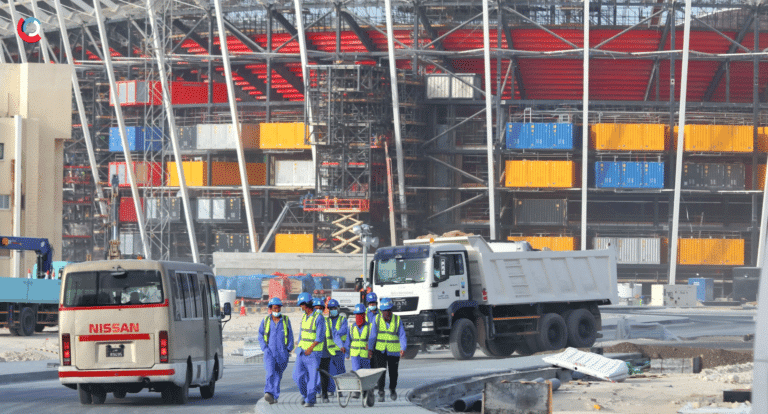By Marco Túlio Lara
Introduction
The FIFA World Cup is set to kick off in Qatar on 20 November. Football fans worldwide eagerly anticipate an event that promises intense emotions and athletic excellence on the field. However, multiple issues continue to bedevil host country Qatar, the most prominent being accusations of “sportswashing” and human rights abuses. As well as its still tenuous diplomatic standing with its neighbours.
With less than a month left before the first kick-off, more people are prioritizing international criticism over the football spectacle.
Sportswashing
Qatar is an authoritarian regime according to the 2021 Democracy Index. It has regulated civil liberties and a weak Consultative Assembly that acts as a rubber stamp for the monarchy. Authoritarian states often use soft power, including sports, to mitigate the perception of repression in a globalized world.
“Sportswashing” attempts to shift focus from a lack of domestic freedoms to more attractive and socially accepted activities to improve a country’s international reputation through sports. It is a strategy that Qatar and its neighbours are very familiar with. United Kingdom (UK) football clubs Manchester City and Newcastle United are de facto owned by the United Arab Emirates (UAE) and Saudi Arabian governments, respectively. In 2011, Qatar joined the trend by purchasing the French club Paris Saint-Germain while the national flag carrier Qatar Airways sponsors multiple European and South American clubs.
The previous year, the emirate was awarded the right to host the 2022 World Cup, marking the first time one of the most watched events on the planet will be held in the Middle East and an Arab-majority country. These two huge Qatari moves into the world of sports attempt to advance foreign policy through soft power and win hearts and minds worldwide.
The Gulf rift
The Qatari attempt to stand out in the region with an independent foreign policy has been strongly condemned by its neighbours, and in June 2017, Saudi Arabia, the UAE, Bahrain and Egypt launched a blockade of the emirate. The four countries cut diplomatic ties with Qatar, prohibited it from using their airspace and sea routes, and Saudi Arabia blocked access to Qatar’s sole overland border crossing.
The coalition listed 13 demands for Qatar to end the blockade. These included issues like relations with Iran and Turkey, supporting political Islamist movements such as the Muslim Brotherhood, and broadcasting Al Jazeera and other media outlets. Prolonged diplomatic tension would have made hosting the World Cup exceedingly challenging due to logistical difficulties.
However, in January 2021, the rift came to a close despite Qatar complying with none of the measures established by the blockading countries. The perception that the blockade was not working – Qatar’s economy performed well despite the crisis – and Saudi Arabia’s wish to improve relations with incoming United States (US) President Joe Biden led to the end of the crisis. This represented a big geopolitical win for Qatar, but also that the tensions that triggered the rift in the first place were not resolved, making a renewed fracture possible down the road.
Accusations of human rights abuses
Hosting the World Cup has been a lot of work. New stadiums, transport facilities, and multiple hotels are under construction, employing thousands of foreign workers from South and Southeast Asia. Numerous credible reports highlighting human rights abuses against these migrant workers during the event’s preparation have drawn significant international criticism.
Reports indicate that migrant workers have faced dire situations. These include instances of unpaid wages and restrictions preventing them from joining or forming trade unions. Changing jobs without their employer’s authorization has proven difficult, and accessing justice has been a protracted ordeal in many cases. Additionally, these workers often face the burden of exorbitant recruitment fees and the confiscation of their passports. Participating in protests led to deportations, and reports highlighted issues of long work hours and forced labor among these individuals. The staggering death toll of at least 6,750 migrant workers in Qatar stands as a tragic outcome of World Cup preparations. This number is likely an underestimate of the actual death toll.
Qatar faced backlash in 2017 for work exploitation. They signed a deal with the International Labour Organization (ILO) to address the issue. Since then, new laws have been introduced to improve conditions for migrant workers. However, concerns remain as reports suggest restrictions on journalistic accreditation and press coverage. Reports indicated that the Qatari government’s several restrictions will effectively limit the press to talk strictly about football.
Unsurprisingly, the issue remains front and centre for human rights campaigners. The Danish national team announced that its players will be wearing protest jerseys during the matches. A symbolic but significant gesture that could generate further protests in light of Qatar’s human rights record. The question remains as to how studiously these labour reforms will be upheld once the fans and the world’s attention move on after the World Cup.
Summary
Despite excited football fans all over the world with less than a month to go before the World Cup kickoff in Qatar. The event seems to have been drawing more attention due to geopolitical and human rights issues than its sporting aspect.
Marco Túlio Lara is a Brazil-based political and security risk analyst covering Latin America.
Read more on a travel guide for the biggest Pride festivals worldwide.
